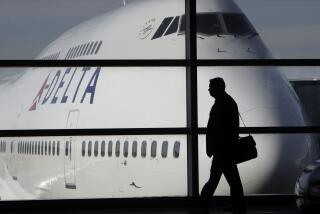Delta, American to Merge Systems for Reservations : ‘Global’ Giant Would Handle About Half of U.S. Air Travel Plans
- Share via
NEW YORK — In a deal that ultimately could be worth $2 billion, American Airlines and Delta Air Lines said Sunday that they would combine their computerized reservations systems, creating a “global” behemoth that will handle about half of the nation’s airline reservations.
American’s system, named Sabre, is already the nation’s largest with computer locations at about 14,000, or 42%, of the nation’s 33,000 travel agents. Delta is a very small player with only about 9% of the market.
A strong computer reservation system is an essential ingredient needed for success in the deregulated airline industry.
“This is a significant development in the competitive environment,” said Timothy Pettee, airline analyst with Merrill Lynch & Co. “It links two of the strongest airlines in the industry, resulting in a very powerful alliance. It should certainly benefit both carriers. It benefits American more in the short run because it will get an immediate cash infusion. But it benefits both carriers in the long run.”
The new American-Delta partnership will be an independently managed company with its own operating and marketing personnel. It will be headquartered in the Dallas/Ft. Worth area, where American has its home office.
Initially, Delta and American will each own 50% of the new company, whose name has not yet been chosen. Each airline will contribute its reservation system to form the partnership. Since American’s system is so much larger than Delta’s Datas II system, Delta will pay American $650 million.
But the two carriers have a chance of reaping a windfall from the merger. In their joint announcement, the two airlines said they would offer other domestic and foreign carriers the chance to invest in the new system. Non-airline companies would also be permitted to buy shares.
Lufthansa, the German airline, has been mentioned as one foreign carrier interested in joining the new partnership. Another, Japan Air Lines, last week denied that it would make such a move.
American and Delta said they each plan to retain at least 25% of the new company, with the balance sold in segments of 1% or more. Hollis L. Harris, Delta president and chief operating officer, said in a telephone interview that a 1% share would cost $20 million. Thus, he said, if half of the company were sold, the two airlines would share $1 billion from the sale, or $500 million each.
Harris said all investors would share future profits of the new company. “We expect to make money,” he said.
The computer reservation industry is composed of five major systems in the United States. Besides Sabre and Datas II, there is Apollo, the second largest, with about 30% of the market. The system is half owned by United Airlines and half by USAir and a group of European carriers. Last year, United sold half of Apollo for $500 million.
Smaller systems include PARS, owned jointly by Trans World Airlines and Northwest Airlines; and SystemOne, owned by Texas Air Corp., which operates Eastern and Continental airlines. There are six other systems in Canada, Asia and Europe.
Track Other Functions
Besides making reservations for major carriers, the systems handle bookings for smaller airlines, car rental companies and hotel chains, charging a fee of $1.50 to $2.00 per reservation. But the carriers that own the systems also reap a huge marketing advantage from them, in addition to the revenue from making individual reservations.
Since deregulation, airline fares and categories of service have proliferated, and the airlines’ computer systems handle in-house functions such as how many seats to sell at a given discount price to maximize both passenger loads and profitability. The systems track the movements of the airlines’ planes on an up-to-the-second basis. They order fuel and catering services for aircraft. The are used for electronic mail within the companies.
Regulatory authorities in this country have been highly critical of single-owner reservation systems, maintaining that multiple ownership breaks an unfair linkage that they contend exists between the systems and their owner airlines.
In the mid-1970s American and Delta urged creation of a neutral, industrywide system for use by travel agencies. American led a task force that developed specifications for such a system. But other carriers withdrew and American subsequently launched Sabre, which houses its IBM-based computer in a deep underground bunker at the Tulsa, Okla., airport. Delta entered the CRS business in 1982.
Both Harris and the companies’ joint announcement sought to fend off any charges that the new combination would be anti-competitive. In fact, they maintained, it would spur competition and eliminate government criticism of reservation systems owned by a single airline.
The executive said he expected the deal to be closed by summer and that no great opposition was expected from the Justice Department.
However, analyst Pettee said that “any level of concentration over 40% (market share) causes concern at the Justice Department. This is going to get a lot of scrutiny.”
More to Read
Inside the business of entertainment
The Wide Shot brings you news, analysis and insights on everything from streaming wars to production — and what it all means for the future.
You may occasionally receive promotional content from the Los Angeles Times.










